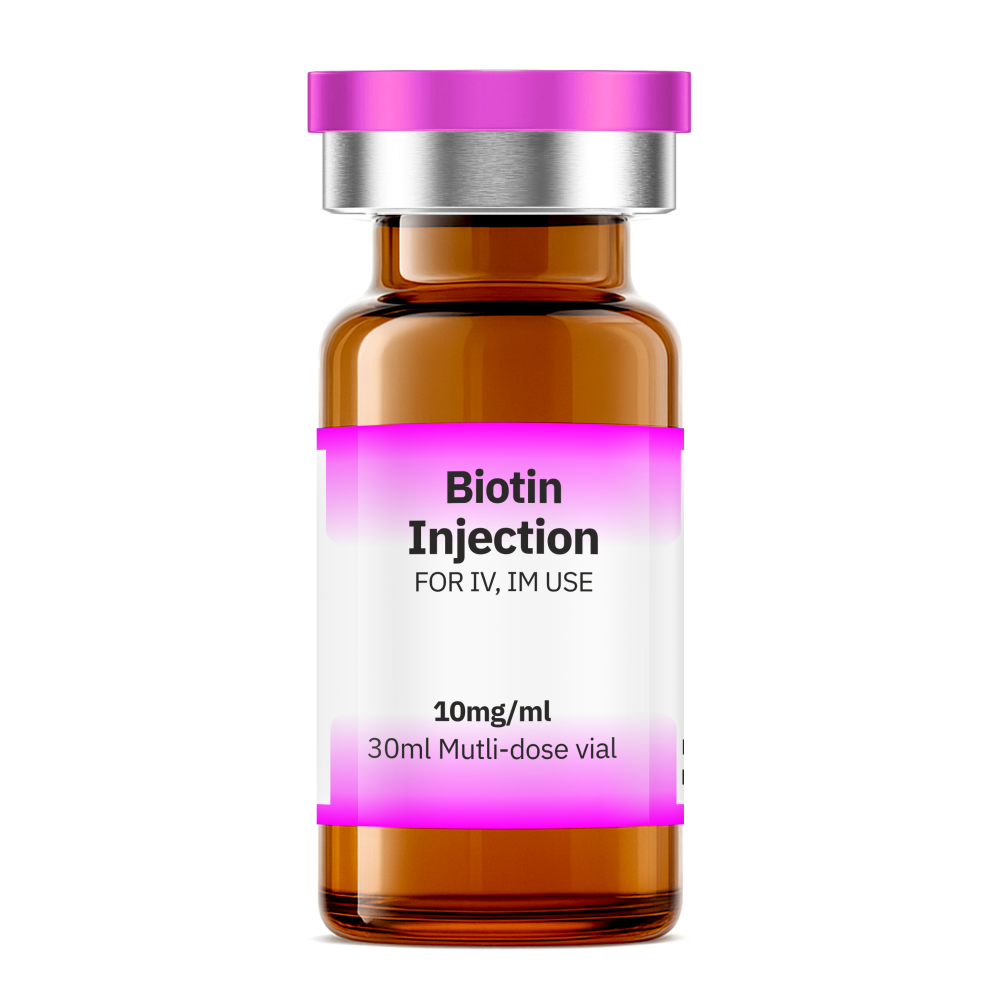
Biotin 10mg/mL
Biotin injections, also known as vitamin B7 or H injections, are used to deliver biotin directly into the bloodstream. This method allows for quick absorption and utilization by the body, which can be particularly beneficial for addressing specific beauty concerns like hair thinning or brittle nails [1][2].
Benefits of Biotin Injections
Healthier Hair, Skin, and Nails: Biotin is well-known for improving the health and appearance of hair, skin, and nails [1][3].
Boosts Energy: Biotin helps convert food into energy, which can boost overall energy levels and combat fatigue [1][3].
Anti-Aging: It contributes to youthful-looking skin and overall vitality [1].
Weight Management: Supports a healthy metabolism and facilitates efficient fat breakdown [1].
Reduces Inflammation: Biotin has anti-inflammatory properties that can improve overall health [1].
Tissue Repair: Assists in regenerating and repairing damaged tissues [1].
Blood Sugar Regulation: Helps regulate blood sugar levels by improving insulin sensitivity [1].
Available to ship to your site 6-8 weeks after ordered
-
10mL/30mL
-
Biotin injections can be administered in two main ways: intravenously (IV) or intramuscularly (IM) [4][2].
Administration Methods
Intravenous (IV) Injection:
Procedure: Biotin is injected directly into a vein.
Benefits: This method allows for rapid absorption and immediate availability in the bloodstream.
Usage: Often used in clinical settings for quick results.
Intramuscular (IM) Injection:
Procedure: Biotin is injected into a muscle, typically in the upper arm, thigh, or buttocks.
Benefits: Provides a slower, more sustained release of biotin into the bloodstream.
Usage: Commonly used for regular supplementation.
Dosage and Concentration
Dosage: Typically ranges from 1 to 3 ml for IV and 1 to 2 ml for IM injections [4].
Concentration: Usually around 0.5 mg/ml [4].
-
Coenzyme Function:
Biotin acts as a coenzyme for carboxylase enzymes, which are involved in critical metabolic pathways such as gluconeogenesis, fatty acid synthesis, and amino acid catabolism [5][6].
These enzymes help in the carboxylation reactions, which are essential for synthesizing fatty acids, metabolizing amino acids, and generating glucose from non-carbohydrate sources [5][6].
Gene Regulation:
Biotin influences gene expression by binding to histones, which are proteins that help package DNA into chromatin [5][6].
This binding can affect the transcription of genes involved in cell signaling, metabolism, and immune function [5][6].
Cell Signaling:
The active form of biotin, biotinyl-AMP, plays a role in intracellular signal transduction by activating soluble guanylate cyclase (sGC), which is involved in various cellular processes [7].
Nervous System Support:
Biotin is essential for maintaining healthy nervous system function. It supports the formation of myelin, the protective sheath around nerves, and helps in the production of neurotransmitters [7].
Anti-Inflammatory Effects:
Biotin has been shown to modulate inflammatory responses by reducing the activity of interleukins and interferons, which are involved in the immune response [7].
-
Contraindications
Allergy to Biotin: Individuals with a known allergy to biotin should avoid biotin injections [8].
Biotinidase Deficiency: People with this rare genetic disorder may require special medical supervision when taking biotin [8].
Precautions
Kidney Disease: Those with kidney disease or on dialysis may need to adjust their biotin dosage and should consult their healthcare provider [8].
Smoking: Smokers may have lower biotin levels and might need supplementation, but should do so under medical advice [8].
Interactions with Lab Tests: High doses of biotin can interfere with certain lab tests, leading to incorrect results. It’s important to inform your healthcare provider if you are taking biotin supplements before undergoing any lab tests [9][3].
-
The following 8 drugs have moderate interactions:
azithromycin
ciprofloxacin
clarithromycin
erythromycin base
erythromycin ethylsuccinate
erythromycin lactobionate
erythromycin stearate
roxithromycin
Biotin has mild interactions with at least 77 different drugs [12]. -
Side Effects
Common: Mild side effects may include gastrointestinal issues like diarrhea [8].
Rare: Allergic reactions such as hives, difficulty breathing, and swelling of the face, lips, tongue, or throat [8]. Skin reactions at the injection site, such as redness or pain, can also occur [10].
-
Pregnancy and Breastfeeding: Biotin is generally considered safe during pregnancy and breastfeeding when used in recommended amounts. However, it’s always best to consult with a healthcare provider [8][9].
-
Temperature: Store biotin injections at room temperature, ideally between 68°F to 77°F (20°C to 25°C) [11].
Environment: Keep the injections away from heat, moisture, and direct light [11].
Children: Ensure that all medications are kept out of the reach of children [11].
Disposal: Dispose of any unused medication after the beyond-use date. Do not flush unused medications or pour them down a sink or drain [11].
-
1. treadwell.com 2. livewellmd.net 3. health.clevelandclinic.org 4. olympiapharmacy.com
5. go.drugbank.co 6. medicine.com 7. mskcc.org 8. drugs.com 9. webmd.com 10. medindia.net
11. bing.com


